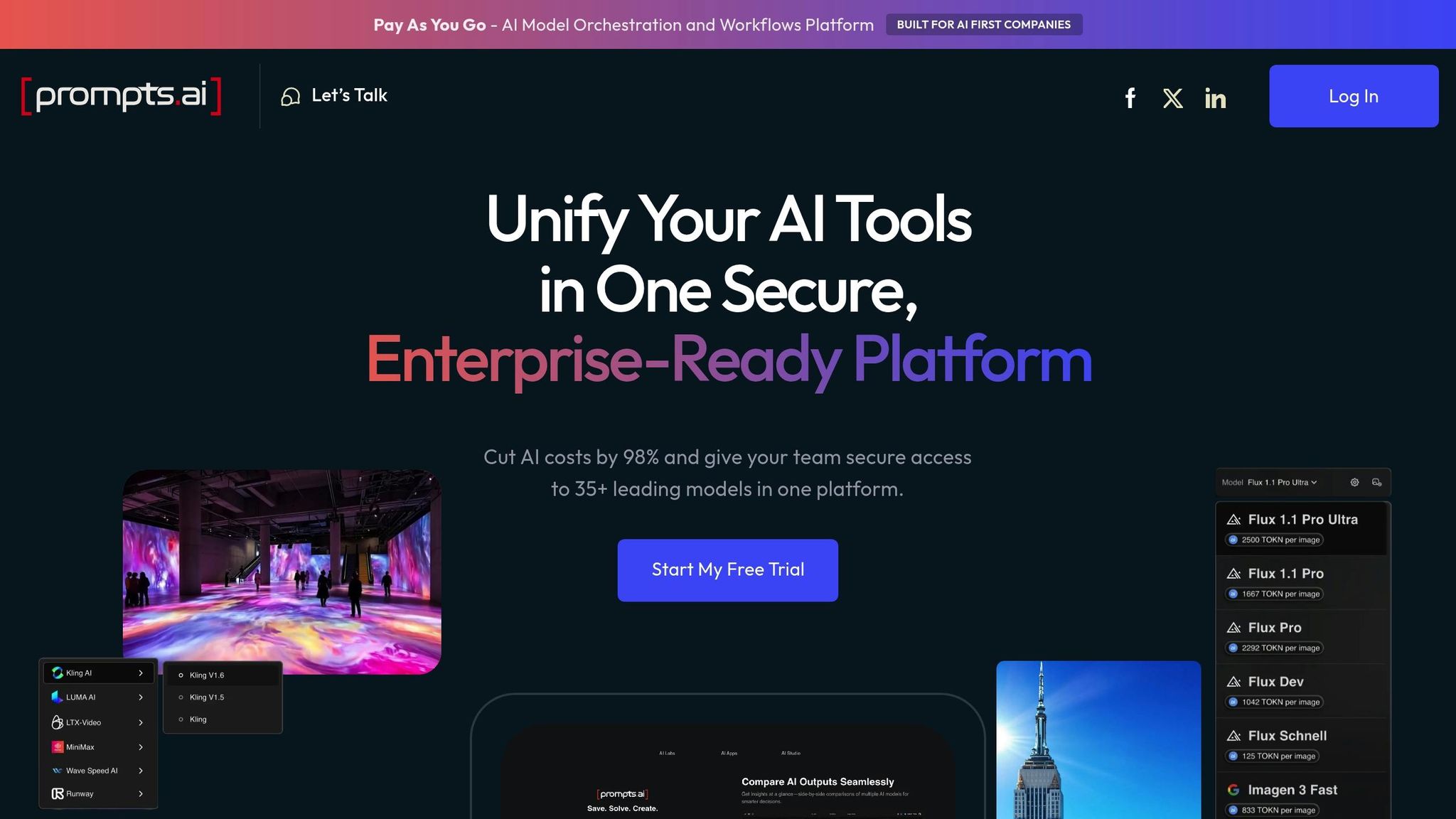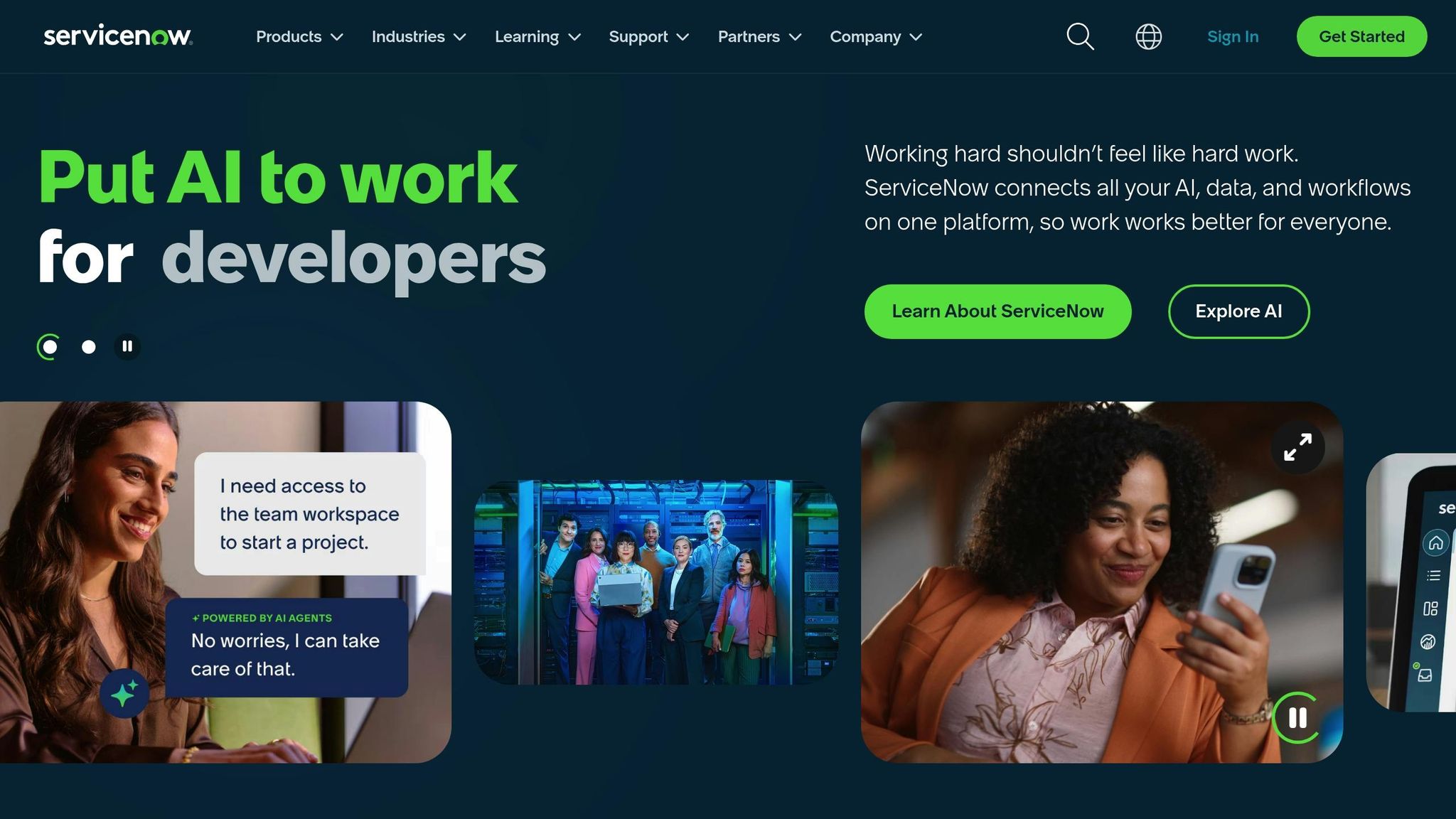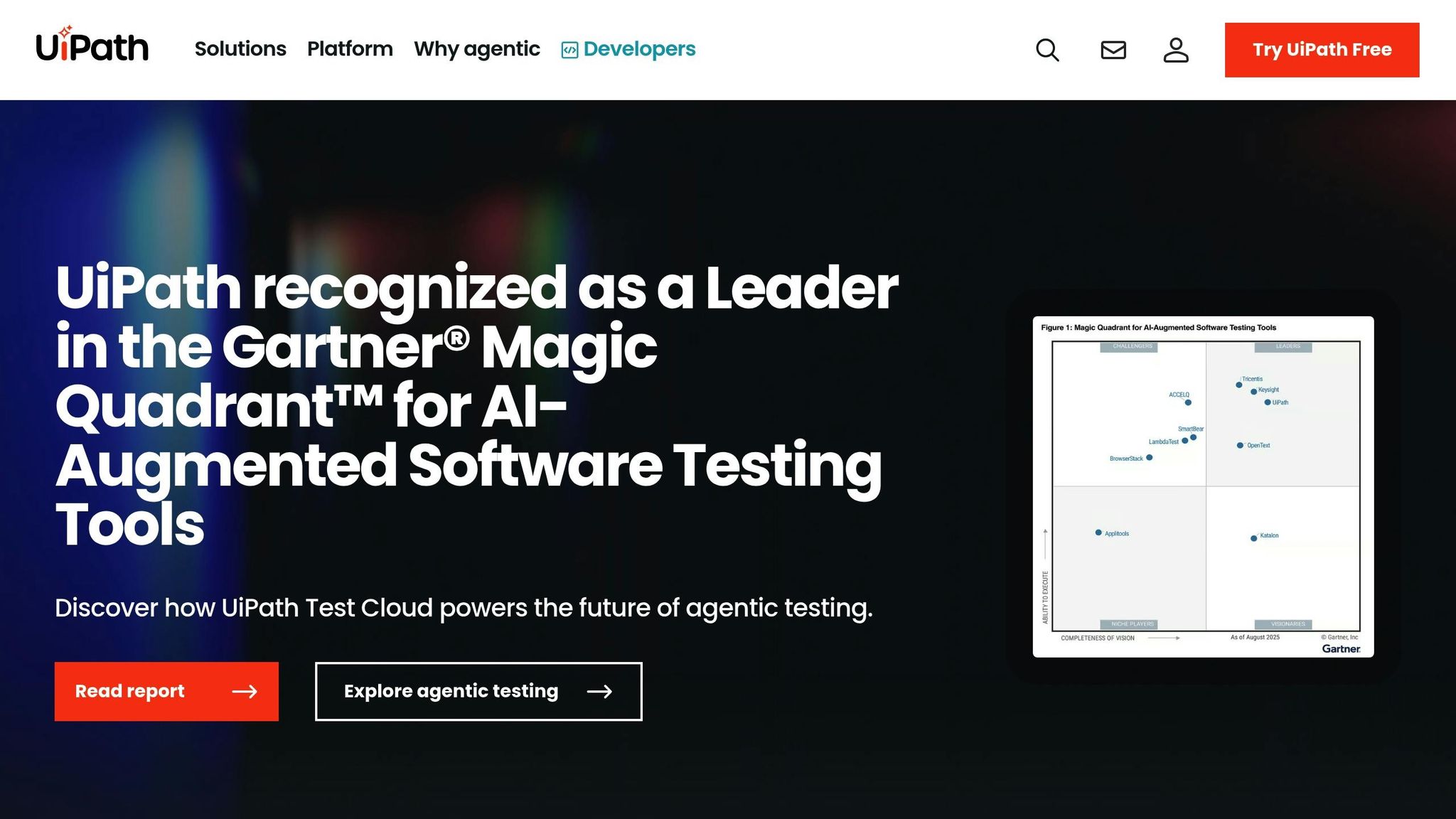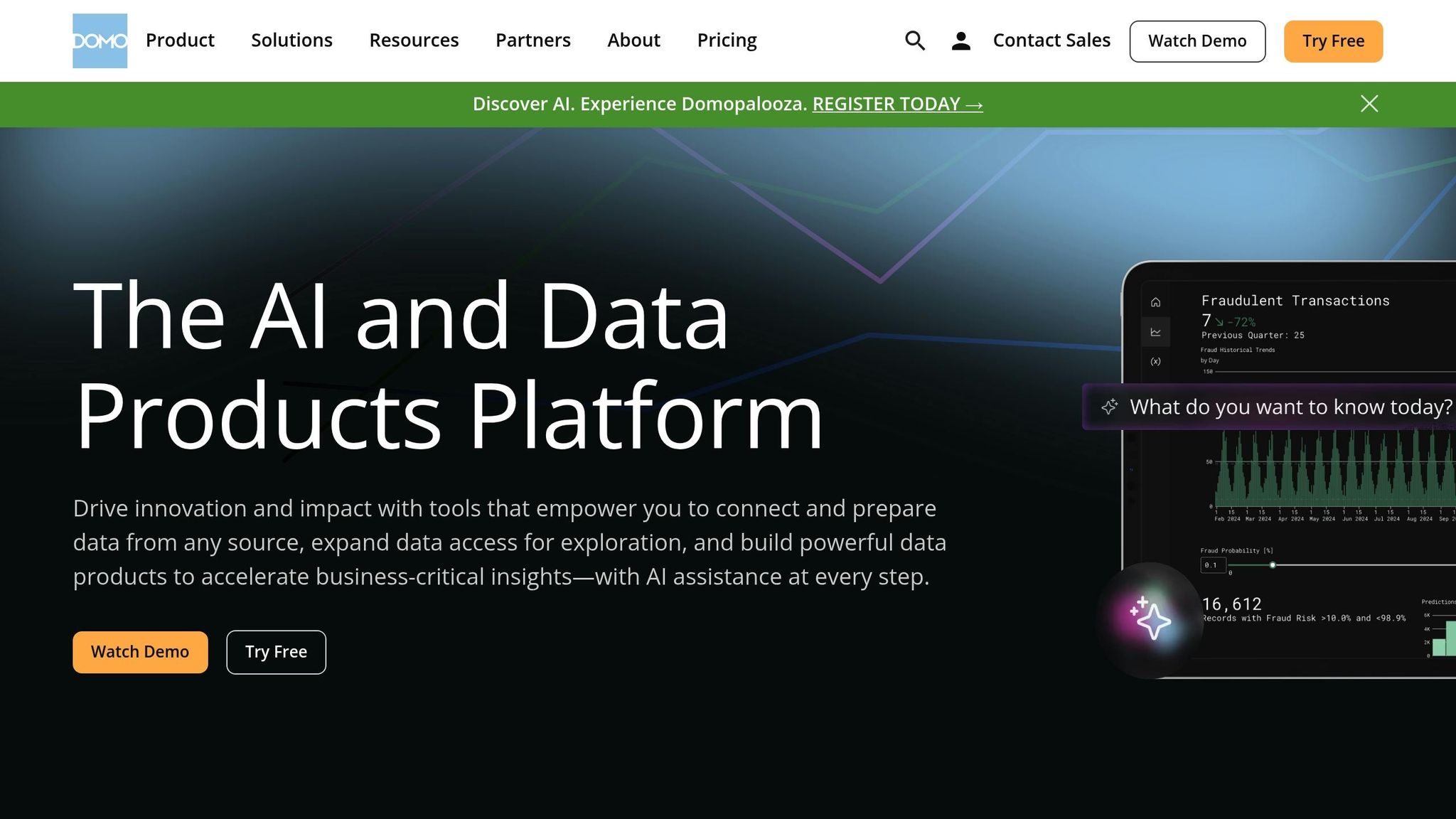
Enterprise AI adoption is accelerating, with 78% of organizations already using AI in at least one function and AI workflows projected to grow from 3% to 25% of all enterprise processes by the end of 2025. Choosing the right platform is critical to manage costs, ensure compliance, and scale effectively. Here’s a quick look at five platforms designed to simplify AI workflows, boost efficiency, and reduce costs:
Each platform offers unique strengths, from workflow automation to compliance and cost transparency. Below is a quick comparison to help you decide.
| Platform | Key Features | Governance | Scalability | Pricing |
|---|---|---|---|---|
| Prompts.ai | Access to 35+ LLMs, FinOps cost tools, secure workflows | SOC 2, ISO 27001, GDPR, HIPAA compliance | Rapid scaling across teams/models | Pay-As-You-Go TOKN credits, $99–$129/month |
| ServiceNow | Multi-agent AI for IT, HR, support workflows | Role-based access, regulatory compliance | Large-scale enterprise support | Custom enterprise pricing |
| UiPath | RPA + AI for document-heavy workflows | SOC 2, GDPR, HIPAA compliance | Scales for thousands of workflows | Custom enterprise pricing |
| Stack AI | No-code workflow builder, document-driven AI | SOC 2, HIPAA, GDPR compliance | Focus on document-centric scaling | Free tier, custom enterprise pricing |
| Domo | Business intelligence and data governance | Data privacy framework, audit controls | Unlimited scalability for high data | Custom enterprise pricing |
Selecting the right platform depends on your enterprise’s needs for cost transparency, security, and scaling capabilities. Platforms like Prompts.ai stand out for cost control and governance, while ServiceNow and UiPath excel in enterprise-scale automation. Let’s explore their features in detail.

Prompts.ai brings together over 35 leading large language models (LLMs), including GPT-5, Claude, LLaMA, and Gemini, into a single secure platform. This eliminates the chaos of managing multiple tools while providing enterprises with strong governance and cost control.
Prompts.ai is designed to work effortlessly with enterprise ecosystems, offering unified conversational interfaces and robust API connectivity. Pre-built connectors for widely used business applications like ServiceNow, Salesforce, and Slack allow companies to integrate AI workflows into their current IT setups. For instance, businesses can automate processes by linking tools such as Slack, Gmail, and Trello. Its ability to support multi-domain deployments ensures quick scalability across departments. In one example, a Fortune 500 company used Prompts.ai to integrate with its CRM and support systems, automating customer inquiry routing and cutting response times by 30%. These integrations not only streamline operations but also bolster compliance and scalability.
Prompts.ai meets strict data protection and privacy standards with SOC 2 Type 2 and ISO 27001 certifications. By incorporating guidelines from SOC 2 Type II, HIPAA, and GDPR, it safeguards enterprise data while providing full transparency and auditability. With centralized policy management and detailed audit trails, businesses can monitor all AI interactions. Prompts.ai also collaborates with Vanta for continuous control monitoring, with its SOC 2 Type 2 audit process initiated on June 19, 2025. Through the Prompts.ai Trust Center, organizations can access real-time updates on security, policies, and compliance progress.
Built for swift deployment, Prompts.ai supports both cloud and on-premises setups. Its flexible architecture allows businesses to add models, users, and teams in minutes, ensuring smooth performance across departments. The platform’s LLM-driven responses align with enterprise data and compliance requirements, while its continuous learning capabilities enable AI agents to adapt to changing demands. Analysts have highlighted these features as key strengths for enterprise use.
Prompts.ai provides clear cost management through detailed usage analytics and reporting. With flexible pricing options, including pay-as-you-go and licensing plans, and a FinOps layer to track and optimize token usage, businesses can reduce AI-related expenses by up to 98%. By linking costs directly to business outcomes, the platform ensures financial visibility, helping organizations make informed decisions about their AI investments.

ServiceNow's AI Platform is transforming how enterprises automate workflows by offering secure, scalable, and manageable multi-agent AI systems tailored for production environments. It tackles a major hurdle for businesses today: transitioning from isolated AI experiments to fully integrated, enterprise-wide AI solutions that deliver meaningful results.
The platform is built to integrate smoothly with existing infrastructure, ensuring that current operations remain uninterrupted. By connecting people, processes, data, and devices across departments, it avoids the fragmentation that often comes with scaling AI initiatives. This seamless integration is especially valuable as organizations expand their AI efforts beyond isolated use cases.
With the release of ServiceNow's updated AI models (v2.0), performance, speed, and functionality for complex enterprise workflows have seen marked improvement. These advancements cater to evolving organizational demands while maintaining compatibility with existing systems. This ensures a strong foundation for governance and regulatory compliance.
ServiceNow's platform is designed to mitigate enterprise risks by incorporating robust security features. A survey by the Artificial Intelligence Industry Association revealed that inadequate governance of Generative AI models has led to financial losses of $50 million to over $200 million for large organizations.
To prevent such costly missteps, ServiceNow offers integrated security tools and developer resources to streamline AI planning, deployment, and monitoring. Unlike fragmented solutions, this unified approach simplifies governance and ensures compliance across the enterprise.
ServiceNow’s AI platform is built to handle the demands of large-scale enterprises. In Q3 2025, the company reported $3.3 billion in subscription revenue, a 22% year-over-year increase, with total revenue reaching $3.4 billion. This growth reflects the rising adoption of AI-driven solutions by major enterprise clients.
During the same period, ServiceNow secured 103 contracts worth over $1 million and 553 customers with agreements exceeding $5 million. These figures highlight the platform’s ability to scale effectively for even the largest organizations.
Looking ahead, the scalability of ServiceNow’s platform aligns with industry trends. By 2029, it’s anticipated that over 60% of enterprises will adopt AI agent development platforms to automate intricate workflows previously managed by humans. With its multi-agent architecture, ServiceNow is well-positioned to meet this growing demand.
ServiceNow also prioritizes cost efficiency in enterprise AI deployments. A joint survey by ServiceNow and Oxford Economics found that 40% of AI Pacesetters - organizations leading in AI adoption - plan to increase their AI investments by 15% or more in the coming years, compared to just 18% of other businesses. This focus on cost transparency and optimization ensures that enterprises can maximize the value of their AI initiatives.

UiPath's automation platform, powered by AI, has become a go-to solution for streamlining enterprise workflows. By combining robotic process automation (RPA) with advanced AI tools, it enables businesses to automate even the most intricate processes while integrating smoothly with existing systems and scaling operations effectively.
UiPath excels at connecting diverse enterprise systems through a robust library of pre-built connectors and APIs. Whether it's SAP, Oracle, Microsoft Office 365, or Salesforce, the platform ensures smooth integration, allowing businesses to create workflows that work across their entire technology stack.
The Studio development environment offers a user-friendly drag-and-drop interface, making it accessible to both technical experts and non-technical users. This feature allows teams to design automations that bridge gaps between departments and systems, ensuring data and tasks flow without interruptions.
One standout feature, Document Understanding, demonstrates this integration in action. It can automatically extract data from various document types - like PDFs or scanned images - and route it to the right systems based on set business rules. This is particularly useful for managing invoices, contracts, or compliance documents across multiple departments, ensuring processes remain secure and efficient.
UiPath prioritizes security and compliance through its Automation Cloud and Orchestrator tools. These provide centralized control, complete with audit trails, role-based access, and encryption, ensuring adherence to standards like SOC 2, GDPR, and HIPAA. The Orchestrator serves as the central hub for managing automation deployments, ensuring only authorized personnel can make changes while supporting collaboration across distributed teams.
Sensitive data is protected through masking during processing and encryption both in transit and at rest, addressing critical security concerns for enterprises adopting large-scale automation.
UiPath's architecture is designed to scale effortlessly. Tools like the Automation Hub and AI Center ensure resources are allocated efficiently, even during fluctuating workloads. The Automation Hub helps enterprises manage automation pipelines, enabling them to prioritize projects based on ROI and resource availability.
The AI Center adds flexibility by allowing businesses to manage machine learning models, deploying both custom and pre-built solutions. This hybrid approach lets organizations tackle specific challenges while leveraging proven automation frameworks.
Thanks to its cloud-native design, UiPath automatically adjusts computing resources to handle varying workloads. This adaptability ensures consistent performance, whether during peak business cycles or periods of lower activity.
UiPath provides tools like the Analytics dashboard and Process Mining to identify inefficiencies and track performance metrics. These features make it easy to measure ROI by highlighting time saved, error reduction, and resource optimization.
The platform’s flexible licensing options cater to different needs. Businesses can choose between attended robots that work alongside employees or unattended robots that operate independently. This flexibility allows organizations to tailor automation levels to their unique requirements, ensuring they get the most out of their investment.

Stack AI is a no-code platform aimed at streamlining the development and deployment of AI-powered workflows for businesses, with a strong focus on user-friendliness and operational efficiency. While it positions itself as an accessible option, its assertions about integrations, governance, scalability, and pricing have not been independently verified. For accurate and detailed insights into its capabilities, it's recommended to review the official Stack AI documentation. Although it offers a simpler alternative, a comprehensive evaluation of its potential requires further independent analysis, especially when compared to the robust features of other platforms mentioned earlier.

Domo stands out as a business intelligence platform tailored for enterprises that prioritize strong data governance. Recognized as a Leader in Data Governance in Fall 2025, Domo has demonstrated its dedication to delivering secure and compliant solutions for managing data in complex operational settings. Its focus on governance directly supports the key priorities enterprises face today.
To meet stringent security demands, Domo offers features like permission controls, audit logs, role-based access management, and usage analytics to track system changes. Additionally, it follows a Data Privacy Framework and provides comprehensive privacy notices, ensuring transparency and adherence to privacy standards.
Selecting the right AI workflow platform demands a thorough evaluation of how each solution aligns with your enterprise's priorities. The table below provides a concise comparison of five leading platforms, focusing on key features, governance, scalability, and pricing. This summary highlights the most critical distinctions to simplify your decision-making process.
| Platform | Key Features | Governance Capabilities | Scalability Options | Pricing Model |
|---|---|---|---|---|
| Prompts.ai | Access to 35+ LLMs (GPT-5, Claude, LLaMA, Gemini), FinOps cost management, side-by-side model comparisons, expert-designed workflows | Enterprise-grade security, compliance controls, audit trails, and full visibility across team interactions | Rapid scaling - add models, users, and teams in minutes | Pay-As-You-Go TOKN credits (no recurring fees); Core ($99/member/month), Pro ($119/member/month), Elite ($129/member/month) |
| ServiceNow | AI agents for IT, HR, and customer support workflows, business logic automation, real-time data connectivity | Role-based access controls, enterprise service management governance | Designed for large-scale service operations across IT, HR, and customer support | Custom enterprise pricing (undisclosed) |
| UiPath | Document Understanding with NLP and handwriting recognition, automation for document-heavy workflows | Robust compliance frameworks and audit capabilities for regulated industries | Supports thousands of concurrent workflows with high document-processing accuracy | Custom enterprise pricing (undisclosed) |
| Stack AI | Knowledge base creation from document collections, retrieval-driven solutions, low-code workflow builders | SOC 2, HIPAA, GDPR compliance (enterprise tier) | Focused on building scalable knowledge bases from large document collections | Free ($0/month – 500 runs), Enterprise (custom pricing with dedicated infrastructure) |
| Domo | Business intelligence integration, permission controls, usage analytics | Not specified | Unlimited scalability for high-throughput environments, handling thousands of concurrent workflows seamlessly | Custom enterprise pricing (undisclosed) |
This overview emphasizes how cost, scalability, and governance influence platform selection. Pricing models are particularly important, as enterprise AI costs can vary widely. Notably, 74% of users report achieving ROI within the first year. Scalability needs also differ - whether you're processing large volumes of documents, managing high-throughput data, or requiring flexibility across multiple AI models. Interestingly, only 1% of companies feel they've fully scaled their AI initiatives, often due to compliance and security obstacles that demand strong governance solutions.
Selecting the ideal AI workflow platform for your enterprise boils down to three essential elements: cost transparency, strong governance, and scalability.
Managing costs effectively is a top priority, as AI-related expenses can quickly spiral without proper oversight. A standout example is Prompts.ai's Pay-As-You-Go TOKN credits model, which eliminates recurring fees while providing real-time FinOps insights. This approach ensures you maintain tight control over spending.
Equally important is governance. Industries with strict regulatory requirements need platforms that can meet these demands. Features like compliance frameworks, detailed audit trails, and clear team interaction visibility are vital for ensuring regulatory alignment. Prompts.ai is designed to meet high compliance standards, making it a reliable choice for regulated sectors.
Lastly, scalability is crucial for businesses aiming to grow. Prompts.ai offers the flexibility to scale quickly, allowing your enterprise to expand seamlessly as needs evolve. Ensuring your platform addresses these critical factors from the outset will position your business for long-term success.
Prompts.ai introduces TOKN credits as a flexible way to access its AI-powered services. These credits act as a universal currency, covering the computational resources required for tasks such as content generation and model training.
With a pay-as-you-go model, you buy only the credits you need, avoiding recurring fees. This system offers a clear way to manage costs while staying responsive to the evolving AI needs of your business.
Prompts.ai offers powerful compliance monitoring and governance tools tailored for industries with strict regulatory requirements. These tools are designed to help businesses manage data securely, maintain detailed audit trails, and implement role-based access controls, ensuring adherence to industry standards and legal obligations.
The platform also includes advanced administration features, enabling organizations to tailor workflows and enforce policies that align seamlessly with regulatory guidelines. This combination makes Prompts.ai a dependable solution for achieving compliance while streamlining enterprise operations.
Prompts.ai connects effortlessly with your existing enterprise systems, creating a unified environment where your tools and AI-driven workflows work hand in hand. This integration eliminates unnecessary friction, automates repetitive tasks, and centralizes AI operations, making processes smoother and reducing manual workload.
With Prompts.ai, you’ll experience increased productivity, cost efficiency through real-time usage tracking, and the flexibility to scale as your business evolves. By simplifying operations, it delivers a transparent and efficient AI solution designed specifically to meet enterprise demands.


